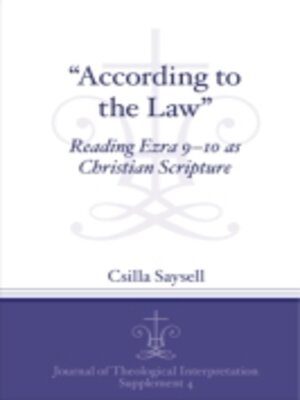"According to the Law"
ebook ∣ Reading Ezra 9–10 as Christian Scripture · Journal of Theological Interpretation Supplements
By Csilla Saysell

Sign up to save your library
With an OverDrive account, you can save your favorite libraries for at-a-glance information about availability. Find out more about OverDrive accounts.
Find this title in Libby, the library reading app by OverDrive.



Search for a digital library with this title
Title found at these libraries:
| Library Name | Distance |
|---|---|
| Loading... |
Christian interpreters have struggled with the story of Ezra 9–10 for many reasons. Its apparent legalism and racism, as well as its advocacy of divorce as a solution for intermarriage, is unacceptable for many Christians, yet this incident is presented in implicitly positive terms, and the narrative forms a part of Scripture. What then should a Christian reader make of such a story, not least from the vantage point of the NT?
The troubling aspects of the incident are considered in Part I through a detailed exegesis outlining the exiles' legal reasoning, rooted in pentateuchal laws. Part II then discusses questions of a broader hermeneutical framework. Saysell suggests that prior Christian assumptions, such as the combination of scriptural authority and the primacy of narrative in interpretation, can lead to an unhelpful way of reading stories that takes them as examples to follow/avoid rather than invites engagement for the renewing of the mind (Rom 12:1–2). One also needs to consider how such a difficult question as intermarriage is handled in the rest of the canon (and in tradition), which put into perspective the solution offered and constrains the meaning of the primary text. Specifically, "the holy seed" rationale (Ezra 9:2), which gives rise to the charge of racism, is shown to have flourished briefly in the Second Temple Period but proved to be a dead end in the long run. A comparison with the NT treatment of a specific intermarriage crisis in 1 Cor 7:12–16, as well as with other, present-day solutions, can highlight what went wrong in the exilic reasoning and yet what constructive challenge the text as Scripture may hold for the Christian reader.







